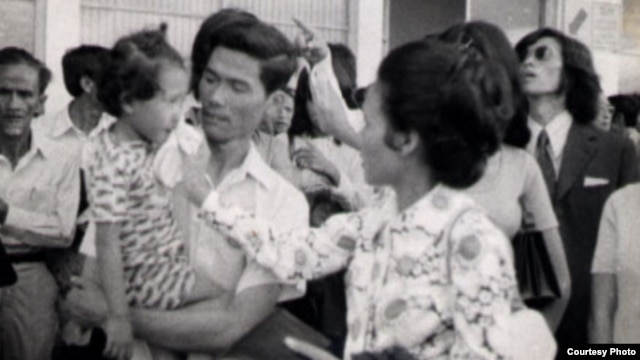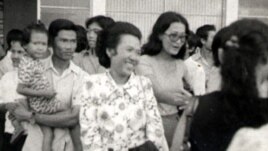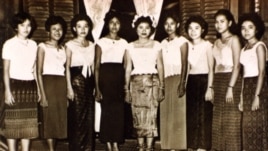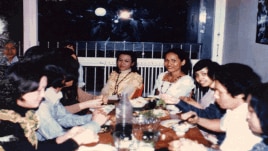Return From France: A Story of Reconciliation and Loss
Neou Sarem says goodbye to her husband, Nuon Sari, and her 3-year old daugther, Nuon Sari Sakhura, at Pochentong Airport, 1974.
VOA Khmer | 30 December 2008
If you were a Cambodian living abroad as the Khmer Rouge took over
the country, would you dare go back? One woman did: VOA Khmer's Neou
Sarem. A teacher in France at the onset of Year Zero, Neou Sarem
understood the Khmer Rouge were dangerous, but she couldn't bear the
separation of her family. VOA Khmer presents "A Return From France,
1976," the story of Neou Sarem's journey back and search of her family.
Neou Sarem was born March 18, 1940, in Kandal province's Kien Svay district, in a household of seven children. Her father, a businessman, owned a cargo boat that carried rice across Indochina.
After graduating Preah Norodom College and Lycee Sisowath, she was trained as a French teacher, instructing in Sisophan from 1964 to 1966 before returning to Phnom Penh in 1966.
She was married in July 1970, to Nuon Sari, who worked at the Bank of Development in Phnom Penh and studied economics and law at the Faculty of Law. Her first daughter, Nuon Sari Sakura, nicknamed Atat, was born April 18, 1971. Her second daughter, Nuon Sari Romuni, or Srey Touch, was born July 24, 1974.
In September, 1974 Neou Sarem was awarded a scholarship from the French government, to study in Besancon for nine months. Eight months after her arrival, the Khmer Rouge swept to power and began Year Zero. By January 1976, she had returned, having lost parents, one sister, her husband, her daughters, and one brother. (Those siblings who survived now live in the US and Canada.)
Neou Sarem was born March 18, 1940, in Kandal province's Kien Svay district, in a household of seven children. Her father, a businessman, owned a cargo boat that carried rice across Indochina.
After graduating Preah Norodom College and Lycee Sisowath, she was trained as a French teacher, instructing in Sisophan from 1964 to 1966 before returning to Phnom Penh in 1966.
She was married in July 1970, to Nuon Sari, who worked at the Bank of Development in Phnom Penh and studied economics and law at the Faculty of Law. Her first daughter, Nuon Sari Sakura, nicknamed Atat, was born April 18, 1971. Her second daughter, Nuon Sari Romuni, or Srey Touch, was born July 24, 1974.
In September, 1974 Neou Sarem was awarded a scholarship from the French government, to study in Besancon for nine months. Eight months after her arrival, the Khmer Rouge swept to power and began Year Zero. By January 1976, she had returned, having lost parents, one sister, her husband, her daughters, and one brother. (Those siblings who survived now live in the US and Canada.)
On June 16, 1979, Neou Sarem arrived in the US, in San Francisco, moving through several towns in California with her younger brother, who had come to America in 1974 on scholarship as a Khmer naval officer. She worked as a social services provider, owned a restaurant and was a volunteer broadcaster, creating Radio Programme, a Khmer-language radio program in Minnesota that is still operating today.
She now lives in Silver Spring, Maryland, with her second husband, Kim Touy Khu, a retired electrical engineer who also lost his wife and children under Democratic Kampuchea. They have one daughter, who lives in Maryland.

A Return From France, 1976: A Decision
When I first heard of the Khmer Rouge evacuation of Phnom Penh, I was so depressed that tears fell on my plate. I heard the voices of my children. I wished a car would hit me, or that I could forget my life. I dreamed I could go far back in time, when I was in high school.
One day, when I was looking at a picture of my family, my three-year-old daughter, the youngest, jumped out to hug me.
Appointments to see the gastronomic physician were frequent on my calendar, and I knew that I had to go back to Cambodia, the sooner the better. I applied to return under the National United Front of Kampuchea, the FUNK, in Paris.
I knew about the evacuation of Phnom Penh, and the Khmer Rouge attack on the US merchant ship Mayaguez, and the rumors of killings. I also knew the Khmer Rouge had lied about an American plan to bomb Cambodia.
But I saw my life in France as not worth living, where I was helpless to
aid my children. So I spent almost all my savings to buy the necessary
things to take back. I bought medicine, vitamins, small knives and
flints in the thousands, and a lot of bras, as well as fishing hooks and
black material for the uniforms of the Khmer Rouge.
A Return From France, 1976: A Nightmare
I went back to Cambodia in 1976 because I didn't want to be separated from my family. Before the birth of my daughter in July 1974, in a predawn nightmare, I had seen myself running alone, near my school at Vimeanh Ekkareach, in a deserted Phnom Penh; in the nightmare, the Viet Cong had evacuated Phnom Penh.
My apartment was empty. My mother-in-law's house near Psar Thmei was also empty.
In my dream, I ended up on a big white cruise ship that departed from Cambodian waters and carried me alone except the family of my cousin. She was there with her husband and her four children. I wept miserably, until my husband woke me from my dream.
At the time, my husband's cousin worked for the International Travel Bureau in Geneva. It was earlier than July 1974, the birth month of my second daughter. I didn't tell my husband about the nightmare, because it was a miserable experience. Not long after, I traveled to France.
A Return From France, 1976: A Nightmare
I went back to Cambodia in 1976 because I didn't want to be separated from my family. Before the birth of my daughter in July 1974, in a predawn nightmare, I had seen myself running alone, near my school at Vimeanh Ekkareach, in a deserted Phnom Penh; in the nightmare, the Viet Cong had evacuated Phnom Penh.
My apartment was empty. My mother-in-law's house near Psar Thmei was also empty.
In my dream, I ended up on a big white cruise ship that departed from Cambodian waters and carried me alone except the family of my cousin. She was there with her husband and her four children. I wept miserably, until my husband woke me from my dream.
At the time, my husband's cousin worked for the International Travel Bureau in Geneva. It was earlier than July 1974, the birth month of my second daughter. I didn't tell my husband about the nightmare, because it was a miserable experience. Not long after, I traveled to France.
There, I met my cousin and her husband, who come to visit me in
Besançon, in northeastern France, and I began a letter to my husband,
asking him to get ready to come to France. I asked him to come because I
didn't want anything to happen as in my dream. I also wrote letters to
my sister-in-law, asking her to loan my husband money enough to bring my
two daughters and join me. I wrote my father-in-law, describing my
nightmare, promising to pay back any money I borrowed by working after
my scholarship ended.
Miserably, the post workers in France at the time were on strike a lot. I
rarely got letters from home. We had to open a post office box on the
border of Switzerland that we checked every two weeks.
Finally, I got a letter from my sister-in-law, whose husband made tons
of money as a manager at Tonle Sap Convoy, bringing food supplies into
Phnom Penh after all the roads were cut off. She told me she had offered
money to my husband, but he had refused it.
When Phnom Penh fell, my family was still there. In order to return, I had to apply for a change of passport, from Khmer Republic to National United Front of Kampuchea. I had to write a letter in support of the FUNK, who had then-Prince Norodom Sihanouk as its head. I didn't have the will to write these letters, so I asked someone to write them for me and I just signed them.
When Phnom Penh fell, my family was still there. In order to return, I had to apply for a change of passport, from Khmer Republic to National United Front of Kampuchea. I had to write a letter in support of the FUNK, who had then-Prince Norodom Sihanouk as its head. I didn't have the will to write these letters, so I asked someone to write them for me and I just signed them.
Those wishing to return to Cambodia had to bring their return ticket to the FUNK mission. Travel was organized in groups, via Air China, with an overnight stay in the Beijing airport. Those who changed their mind could return to France from Beijing, or they could sightsee for 60 francs a day.







No comments:
Post a Comment